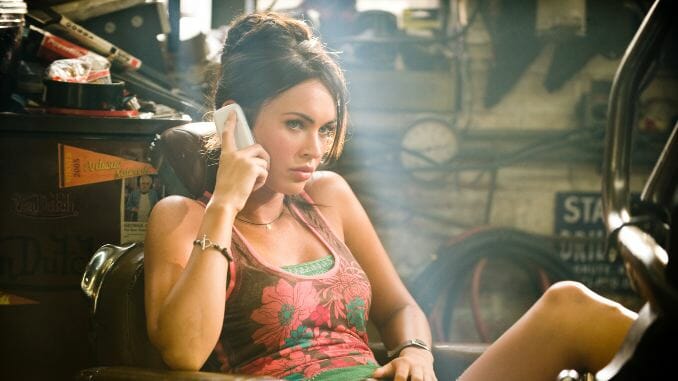The Transformers Movies Lost the Plot When They Ditched Megan Fox

Transformers: Dark of the Moon came out 10 years ago to mostly negative reviews. Critics were never the series’ loudest cheerleaders, but beyond a predictable lack of enthusiasm for the third entry in the blockbuster franchise, the film made a fatal flaw in losing series co-star Megan Fox—the first domino to fall in Transformers’ slow decline in the following years.
One could argue that the series fizzled out by succumbing to the scourge of “worldbuilding,” but more to the point, it turned its back on its strongest asset: Fox. Or more broadly, it turned its back on the human element that she and other casually jettisoned elements represented.
There’s a lot to criticize in the Transformers franchise, no doubt. Regressive depictions of race and gender, hokey dialogue, rah-rah militarism and a more-is-more approach to action set pieces have been among the more common, very justified complaints from critics. But well-earned snark aside, even if we approach these films on their own terms, letting ourselves get invested in a story based on a toy line and centered on MacGuffins with names like the “Matrix of Leadership,” there’s a real dip in quality when we hit part three. Parts one and two are genuinely a lot of fun—emotionally engaging, even—and there’s a very human reason for that.
To break this down quickly, there’s an ancient, ongoing war between Autobots and Decepticons, two races of giant robots who can transform into various vehicles. In the original film, Sam Witwicky (Shia LaBeouf) is our human protagonist, a dork with no romantic prospects who gets embroiled in the drama via his new car, a yellow Camaro-cum-Autobot named Bumblebee. When Sam’s crush, Mikaela Banes (Megan Fox), happens to witness Bumblebee transforming, she dives down the rabbit hole with Sam to fight by his side with the Autobots.
The second film, Revenge of the Fallen, was already faltering when the writing team opted to give Mikaela less to do. She spends the first few reels pining for Sam, who’s off at college now, and the rest of the film, once they’re reunited, playing sidekick as he ascends to the status of Prime—a designation traditionally reserved for big daddy Autobots who look over a brood of smaller, younger Transformers. The film also dropped some of the supporting cast who’d helped the first film rise above some of its sillier plot points, most notably an odd-couple pair of tech wizzes played by Anthony Anderson and Rachael Taylor.
We’re still in serviceable human territory in Revenge of the Fallen, though. Beyond Mikaela’s general ass-kicking, I have a fondness for Sam’s well-intentioned, kind of clueless, ultimately caring and protective parents (Kevin Dunn and Julie White), and they get a good amount of screentime adjusting to the empty nest while palpably proud of their boy, the first Witwicky to go to college.
But with Dark of the Moon, there’s a sudden shift, reflected most notably in Mikaela’s absence. The premise is admittedly pretty cool and arguably has more narrative potential than the first two outings: What if the creation of NASA and the 1969 Moon landing were all a cover for the U.S. government to dig around Transformer wreckage on the lunar surface? Fun plot points aside, the soul of the franchise is gone before the film even starts; Mikaela is gone.
Fox’s departure from the series (as well as her generally vile and sexist treatment by Hollywood and the press) has been extensively documented. Ultimately, her relationship with director Michael Bay soured while promoting Revenge of the Fallen—and following a fateful interview in which she detailed Bay’s misogyny and habit of endangering crew on set, and infamously accused him of wanting to be a tyrant like Napoleon or Hitler.
The response was swift and mean. A deeply offensive open letter by three anonymous crew members who’d worked with Bay called Fox “dumb,” “trailer trash,” “thankless,” “classless,” “graceless” and a “bitch.” The letter appeared on the director’s website soon after the interview and was taken down only after the damage had been done. Then she was unceremoniously dropped from the third film ahead of filming the following year (Fox maintains that she quit, while Paramount claimed at the time that it was the studio’s unilateral choice). As ugly and public as the whole affair was, it was a fittingly cruel turning point on the road to stripping Transformers of its humanity by way of removing Megan Fox.
This isn’t just about Fox, though. It’s also about the people who give these kinds of movies something to root for. With Dark of the Moon, the Transformers franchise committed to ignoring the human core of any good movie about giant robots (or monsters) wreaking havoc on little old us. Big tentpole monster movies (or smaller indies like Nacho Vigalondo’s brilliant Colossal) tend to need humans to ground them and give them emotional weight. It was odd to see fans react with outrage to 2014’s Godzilla for giving the titular force of nature just eight minutes of screen time, and again to see the internet rise up over critiques of the two-dimensional homo sapiens of Godzilla vs. Kong earlier this year.
“It’s not about the humans, duh!” the narrative goes. But it’s hard to accept this line of reasoning. Titans may not care about our fates as they lord over our world with impunity, but we puny humans sure do! And that’s why their massive conflicts matter to us. Thus far, Kong: Skull Island is the only “MonsterVerse” outing to fully grapple with the futile and tragic role of humans amongst nearly unstoppable, prehistoric kaiju.
-

-

-

-

-

-

-

-

-

-

-

-

-

-

-

-

-

-

-

-

-

-

-

-

-

-

-

-

-

-

-

-

-

-

-

-

-

-

-

-








































